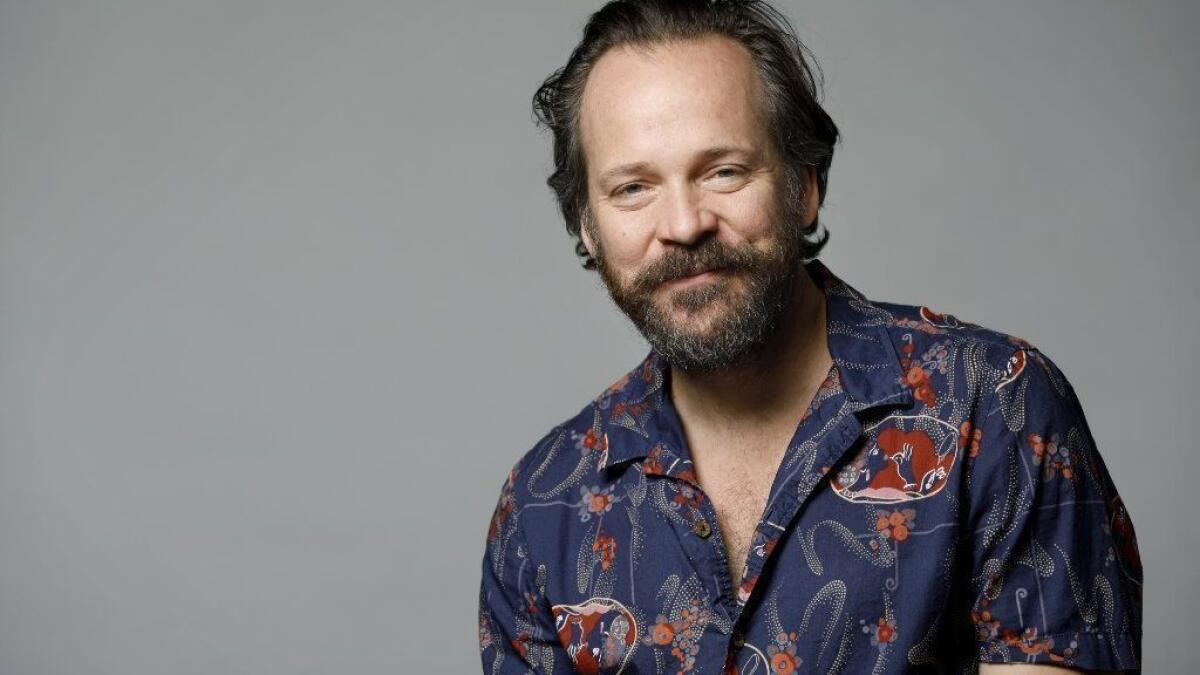Peter Sarsgaard couldn’t turn his back on ‘The Looming Tower’ and the issues behind 9/11

- Share via
It took Peter Sarsgaard five months to consider signing on to Hulu’s “The Looming Tower.”
The 10-episode series, based on Lawrence Wright’s 2006 Pulitzer Prize-winning nonfiction book of the same name, traces the lead-up to the 9/11 attacks nearly two decades ago. Sarsgaard, who had read the book not long after its release, said he ultimately took the plunge because he hadn’t stopped thinking about the script.
In the series, he plays Martin Schmidt, a composite character who is the head of the CIA’s Al Qaeda task force. Schmidt is often at odds with his FBI counterpart John O’Neill (played by Jeff Daniels).
WATCH: Video Q&A’s from this season’s hottest contenders »
Sarsgaard recently paid a visit to the L.A. Times video studio, where he discussed Wright’s book, the clashing between the CIA and the FBI, and media literacy.
“The Looming Tower” is based on the book of the same name. But you didn’t want to do it at first?
An emotional event like this, everyone’s first reaction is just to lick their wounds, you know? It’s completely understandable. Like if you have a relative who died of a drug overdose, not everybody wants to talk about the heroin problem on the day of the funeral. So for a long time, I was just not interested in talking about the hows and whys of what had happened. So when this book came along, I think it came along in, like, 2007. It really went after all these questions that we had all been either too afraid to ask, or people weren’t providing answers to for one reason or another.
What do you remember about when you finally read the book?
The book is just extraordinary. It just has so much detailed information on how we arrived at that day. It’s like a way through the grieving process. I think it’s a very important thing to consider now.
Martin Schmidt can be rather territorial and prickly.
He’s quite defensive about his own involvement, which is, of course, very natural behavior. I don’t find him to be the person where we should put blame, if there’s a person. You just sort of see the way that human behavior leads toward things like this. One thing sets off another thing, sets off another thing.
How was it for you on the set? What did you guys do?
Jeff sort of plays his guitar, which he wears headphones for, and has a Tigers baseball game on all the time. But he’s a really intelligent, interesting guy, and I always enjoyed his energy, and I felt like we were playing people that were going at each other all the time, so it wasn’t really like we were, you know, celebrating each other’s birthdays or anything.
You guys really go at it. His character is based on John O’Neill —
Who died on 9/11.
Yeah. Talk about playing these two agencies that can’t quite work together, the sort of turf wars that were going on.
It would be behavior that’s familiar to audiences, like just the way our relatives act with each other, this is the way we act with each other. A lot of time, we hold agencies and government, and certain people up to a different standard than we ourselves even do. I know we have great reason to be very critical of the government right now. But the onus is on us. We are the revolutionaries. We are the people that carry the Constitution. It’s our responsibility. The people are bigger than the government. And I think just make your own neighborhood what it should be, you know? And let that positivity spread. And that’s the best economic message too, anyway.
Did it make you think about news differently, or make you a more critical person now watching the news?
Critical is the understatement of the year. I mean, it’s difficult to consume news. I think the main thing is to not get sidetracked by the salacious, because that’s what happened with Monica Lewinksy [during the Clinton Administration], and that’s what took our eye off of Al Qaeda, really, it’s one of the things. It’s that we’re always interested in that stuff more. And if there’s one takeaway for me from it, it’s like, I was thinking of that time, and I thought, I was paying attention to Monica Lewinsky. When 9/11 happened, and I was right downtown, I thought, “This is Osama bin Laden.” I knew his name because of the previous bombing. But I hadn’t really thought about it. And I think for a lot of people that day, when they started saying, “It’s Osama bin Laden,” we went, “Oh, yeah, that guy that’s just been standing there the whole time.” So I worry that we’re getting into a similar territory like that now, and with the way information even comes to us, and people have this thing on their phones where it delivers — .”
You get the alerts all the time.
You get the alerts and the alert could be, like, “Boy trapped in refrigerator eats own foot,” you know? Or it could be Kim Jong Un is threatening Japan, you know? You don’t know.
More to Read
From the Oscars to the Emmys.
Get the Envelope newsletter for exclusive awards season coverage, behind-the-scenes stories from the Envelope podcast and columnist Glenn Whipp’s must-read analysis.
You may occasionally receive promotional content from the Los Angeles Times.











